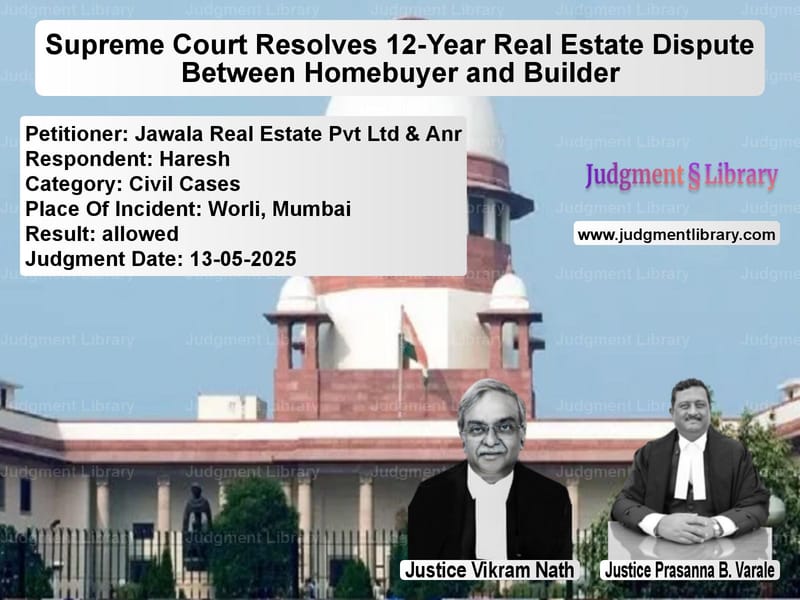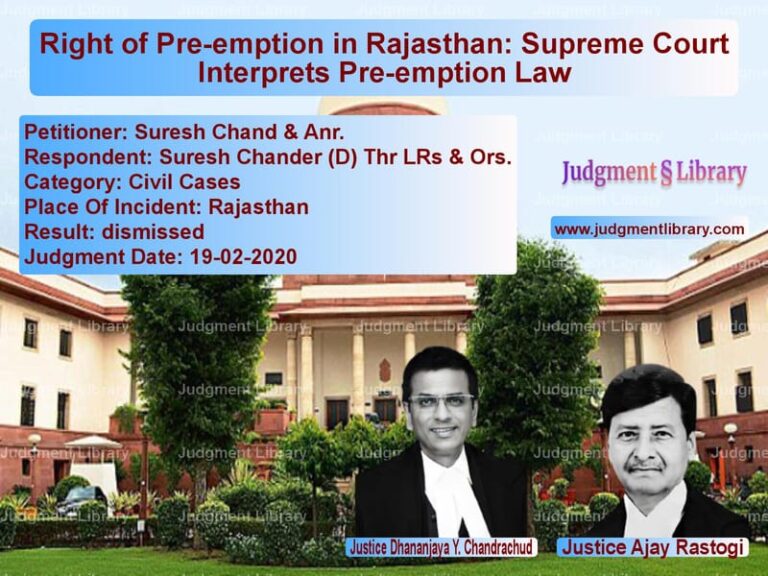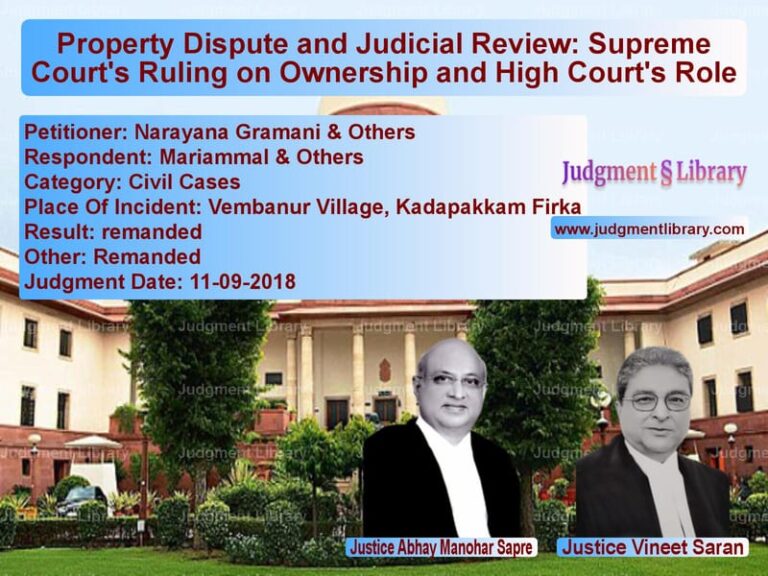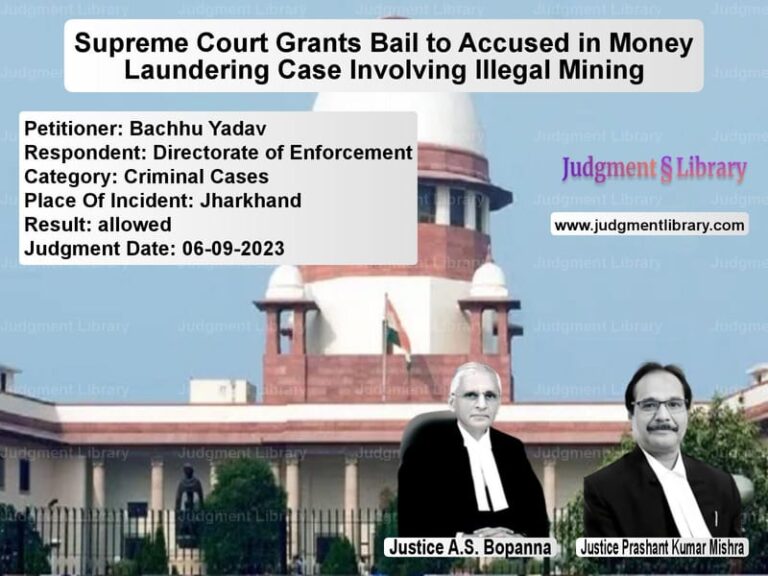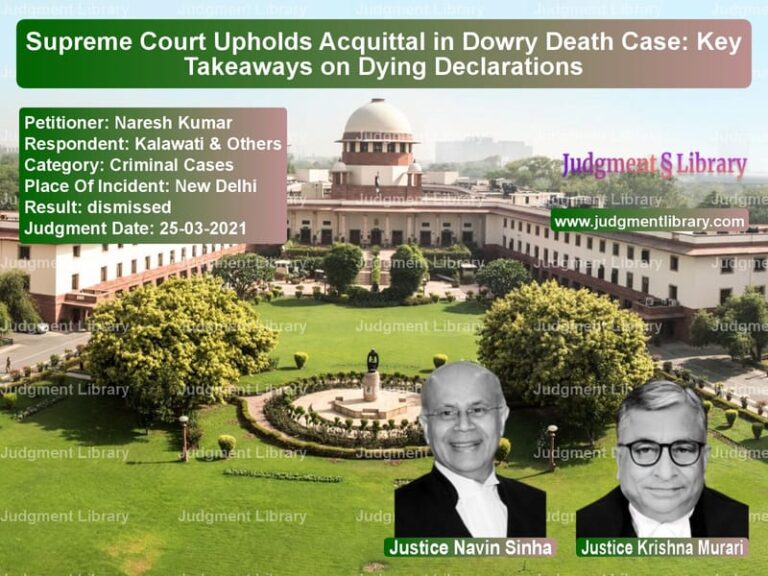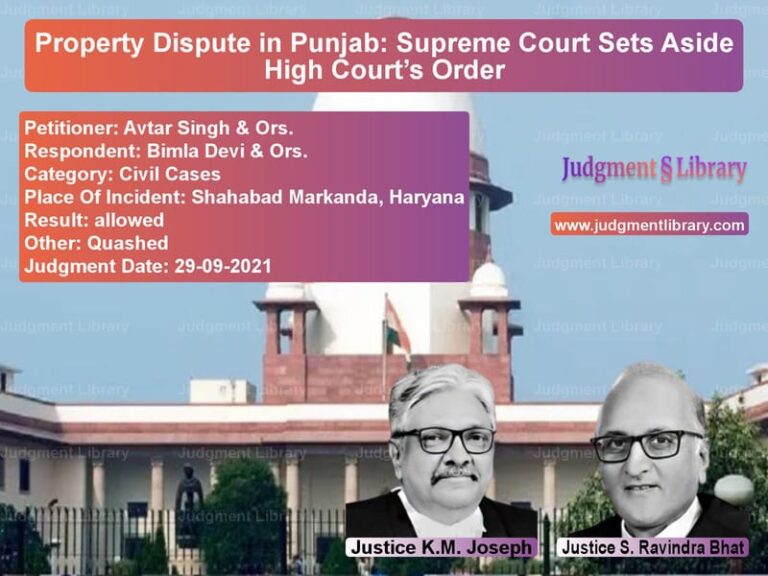Supreme Court Resolves 12-Year Real Estate Dispute Between Homebuyer and Builder
In a landmark judgment that brings closure to a protracted legal battle spanning over twelve years, the Supreme Court of India has finally resolved a complex real estate dispute between a homebuyer and a prominent developer. The case involved Jawala Real Estate Pvt Ltd (now amalgamated with Macrotech Developers Ltd) and homebuyer Haresh, concerning a luxury apartment in the prestigious ‘Lodha Codename Blue Moon’ project at Worli, Mumbai.
The dispute originated in 2013 when Haresh paid an advance amount of Rs. 92,50,744 towards a three-bedroom apartment priced at Rs. 4,64,86,145. The apartment, numbered 6403 in Building B Wing (Alpha Tower) of the Lodha Allura project, was supposed to be the dream home for the respondent. However, what followed was a decade-long legal ordeal that exposed several concerning practices in the real estate sector.
The core of the dispute began when the developer cancelled the allotment through a letter dated June 28, 2013, despite the homebuyer having paid a substantial advance amount. The respondent had been consistently requesting the appellant to provide relevant documents so that a registered agreement could be executed, while the builder was issuing written notices demanding payment of the balance amount and threatening cancellation.
This cancellation prompted the homebuyer to approach the National Consumer Disputes Redressal Commission (NCDRC) with Complaint Case No. 210 of 2013. During the proceedings before the NCDRC, a significant development occurred that would complicate the case further. The Commission, in its order dated November 19, 2013, granted an interim measure directing that “the appellant would not create any third-party rights with respect to the apartment in question i.e. apartment No. 6403.”
Despite this clear directive, the appellant admitted to having alienated the said apartment on November 24, 2014. This act of selling the disputed property while legal proceedings were ongoing demonstrated a blatant disregard for judicial orders and would become a crucial factor in the Supreme Court’s final decision.
The NCDRC eventually allowed the consumer complaint on February 17, 2016. In its operative order, the Commission directed that “we hereby set aside the cancellation order of allotment dated 28.6.2013 in respect of the premises in dispute. We hereby direct the opposite parties to execute and register the agreement for sale and agreement in favour of the complainant in respect of said residential flat in conformity with the provisions of MOFA Act as per clause 6 quoted above, within 90 days from today and prepare the scheduled of payment as per the provisions of MOFA Act prescribed under Rule 5, Forum V of MOFA Rules 1964.”
The NCDRC also imposed penalties and compensation, noting that “the complainant is present in person. He has come from Bombay and has suffered the agony and harassment for the last 3 years. Consequently, we award Rs.1 lakh against the opposite parties. The said amount be paid to the complainant within 90 days otherwise it will carry interest @ 9% per annum till its realisation.”
Since the original apartment had already been sold in violation of the stay order, the developer applied for modification of the NCDRC order, suggesting that an identical flat on the next higher floor (apartment no. 6503) be substituted. The NCDRC rejected this application on December 16, 2016, making “a sharp comment on the conduct of the appellant that the order of stay was passed in their presence and, as such, it was incomprehensible as to how they could have alienated the same by mistake as alleged. It observed that as a matter of fact, the appellant was in contempt and, therefore, no modification is required.”
The matter then reached the Supreme Court through a civil appeal. In its initial order dated March 20, 2018, the Supreme Court took a different view, stating that “the application for modification ought to have been allowed by the NCDRC as no contempt petition had been filed” and accordingly allowed the appeal. The Court directed that “whatever amount was payable for the original apartment, the same would be payable for the alternate apartment offered, and consequently, stipulated a period of two weeks to execute the agreement between the parties within two weeks as directed by the NCDRC in accordance with the Maharashtra Ownership of Flats Act, 1963.”
However, even this Supreme Court order failed to resolve the matter, leading to the filing of Miscellaneous Application No. 2426 of 2018. The appellant contended that they “sent repeated letters of demand to the respondent to make the balance payment and get the agreement executed and registered, but the respondent did not pay any heed to these letters.” On the other hand, the respondent claimed that he “had been repeatedly writing to the appellant to provide necessary clearances, the relevant maps and the carpet areas of both the apartments – the original as well as the alternate one offered, but he failed to receive any response from the appellant.”
The case went through multiple hearings, mediation attempts, and Lok Adalat proceedings without success. Finally, in a series of orders in 2024, the Supreme Court directed the respondent to deposit the balance sale consideration of Rs. 3,72,35,401 with the Registry. The amount was subsequently placed in a fixed deposit with a nationalized bank while the Court determined the final settlement.
The central issue that remained for the Supreme Court’s determination was the quantification of additional amounts payable by the homebuyer. The appellant made substantial claims totaling Rs. 4,96,52,565, broken down as: “Interest @ 9% per annum on consideration value as well as on other charges: Rs. 3,98,42,426/-, Other charges [including infrastructure charges, legal charges, utility connection & distribution expenses, club membership charges, charges for formation and registration of society, Building Common Area Maintenance (‘CAM’) charges, additional BCAM charges, Federation CAM charges, Additional Federation CAM charges and property tax]: Rs. 65,67,208/-, Taxes on consideration value: Rs. 23,17,990/-, Delayed payment admin charges of 2%: Rs. 9,24,941/-”
In response, the respondent admitted liability only for Rs. 2,15,884 towards legal charges, utility connection & distribution charges and charges for formation of society. He also agreed to pay an additional Rs. 15,37,126 towards infrastructure charges and club membership charges if directed by the Court. For the remaining amounts, the respondent “denied its liability placing strong reliance on Sections 4 and 6 of the MOFA.”
The Supreme Court, in its final analysis, made several crucial observations about the developer’s conduct. The Court noted that “the appellant has not provided the relevant documents asked by the respondent relating to the building map, carpet area, relevant NOCs right from the beginning. Neither in any of the communications to the respondent nor in the submissions before us, the appellant has ever stated that it actually provided the documents required by the respondent.”
The Court particularly emphasized the serious nature of the developer’s violation of judicial orders, stating that “the appellant, being well aware of the stay order dated 19.11.2013 passed by the NCDRC restraining it from creating any third-party rights, in gross violation of the same, proceeded to alienate the original allotted apartment no. 6403 on 24.11.2014 during the pendency of the proceedings before the NCDRC. This alienation has created further complication in the proceedings and has also caused considerable delay in the matter preventing it from attaining finality.”
The Court also noted that “even after the orders passed by this Court, the appellant has not come forward with the specific carpet area of the original allotted apartment and the alternate offered apartment i.e. 6403 and 6503.”
In balancing the equities, the Court acknowledged that “the respondent undoubtedly could not enjoy the possession of the apartment but the fact also remains that the balance consideration of Rs. 3,72,35,401/- remained with the respondent. Simultaneously, we cannot lose sight of the fact that during this period, the appellant has been maintaining the said apartment and paying the essential charges to respective bodies/associations. As such, there needs to be some adjustment of equities between the parties.”
The Supreme Court, exercising its powers to do complete justice, decided not to deal with each issue individually but instead imposed a consolidated settlement amount. The Court directed that “the respondent shall pay the following amounts: i) Admitted amount of Rs. 2,15,884/-, ii) Amount that the respondent is ready to pay on the direction of the Court – Rs. 15,37,126/-, iii) Taxes on consideration value – Rs. 23,17,990/-, iv) Amount of Rs. 1 crore over and above the above-mentioned amounts.”
Thus, the total additional payment required from the homebuyer was fixed at Rs. 1,40,71,000, to be paid within eight weeks. The Court clarified that “the payment of above amount is being provided in lieu of clearance of all the outstanding dues of interest/taxes and other charges etc. upon the respondent up to 05.02.2025, i.e. the date on which possession has been handed over to the respondent.”
The Court also directed that “the parties are further directed to get the agreement to sale/sale deed executed within two months after the aforesaid payment is made. The expenses for the stamp duty, registration etc. would be borne by the respondent in accordance with law.”
This judgment represents a significant example of the Supreme Court’s role in resolving long-pending disputes by balancing legal rights with practical considerations. While acknowledging the developer’s wrongful conduct in violating court orders and failing to provide necessary documents, the Court also recognized the economic realities of maintaining the property over the years. The settlement amount of Rs. 1.4 crore, while substantially lower than the developer’s claim of nearly Rs. 5 crore, reflects the Court’s attempt to do equitable justice between the parties after considering all aspects of this twelve-year legal battle.
The case serves as an important precedent for real estate disputes, particularly highlighting the consequences of violating judicial stay orders and the importance of transparency in providing documentation to homebuyers. It also demonstrates the consumer protection framework’s effectiveness in safeguarding homebuyers’ rights while ensuring that developers receive fair compensation for their legitimate claims.
Petitioner Name: Jawala Real Estate Pvt Ltd & Anr.Respondent Name: Haresh.Judgment By: Justice Vikram Nath, Justice Prasanna B. Varale.Place Of Incident: Worli, Mumbai.Judgment Date: 13-05-2025.Result: allowed.
Don’t miss out on the full details! Download the complete judgment in PDF format below and gain valuable insights instantly!
Download Judgment: jawala-real-estate-p-vs-haresh-supreme-court-of-india-judgment-dated-13-05-2025.pdf
Directly Download Judgment: Directly download this Judgment
See all petitions in Property Disputes
See all petitions in Consumer Rights
See all petitions in Contract Disputes
See all petitions in Judgment by Vikram Nath
See all petitions in Judgment by Prasanna Bhalachandra Varale
See all petitions in allowed
See all petitions in supreme court of India judgments May 2025
See all petitions in 2025 judgments
See all posts in Civil Cases Category
See all allowed petitions in Civil Cases Category
See all Dismissed petitions in Civil Cases Category
See all partially allowed petitions in Civil Cases Category

